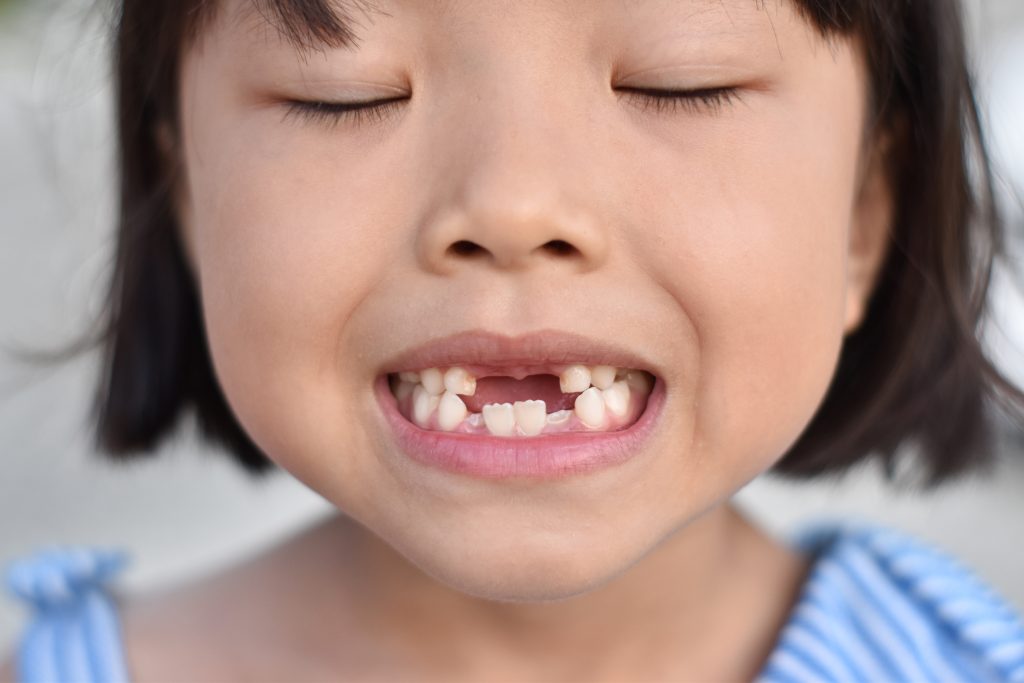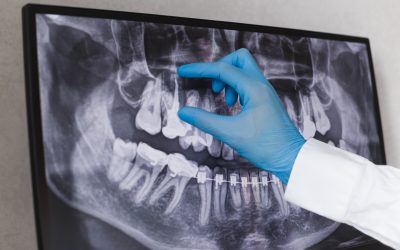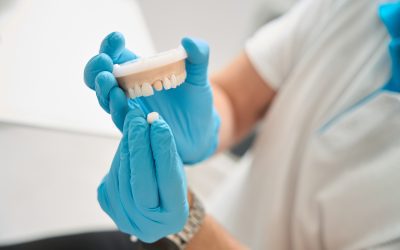Pediatric dentistry is an American Dental Association-recognized dental specialty. But what is a pediatric dentist? Pediatric dentists, also known as pedodontists, are dental professionals who specialize in diagnosing and treating dental problems in infants, children, and teenagers. Their unique expertise addresses the distinct dental issues affecting this age group, ensuring proper oral health from infancy through adolescence.
What is a Pediatric Dentist vs. a General Dentist
Education and Training
A pediatric dentist and a general dentist both complete dental school to obtain their dental degrees. However, a pediatric dentist goes through an additional two to three years of training after dental school. This training is necessary when treating children and adolescents who require gentler care.
Treatment Scope
Both pediatric and general dentists can provide dental care for children, but their areas of expertise differ. A general dentist treats patients regardless of age, including children, adults, and seniors. On the other hand, a pediatric dentist develop specialized knowledge and skills to cater exclusively to children, from infants to teenagers.
Specialized Care
When it comes to pediatric dentistry, these specialists excel in providing child-friendly care. Due to their exclusive experience working with young patients, pediatric dentists are adept at interacting with children, including those with special needs and disabilities. They also offer guidance on habits like thumb-sucking and extended pacifier use.
Pediatric dentists are often equipped with child-sized dental equipment and maintain a kid-friendly environment in their offices, helping children feel at ease during their appointments. As a result, pediatric dentists are well-suited to address children's unique dental concerns, ensuring they receive the best possible dental care.

Pediatric Dentistry Services
Pediatric dentists provide a wide range of dental services tailored to the specific needs of children. Focusing on preventive care, orthodontics, restorative dentistry, and sedation techniques ensures the proper development and long-term oral health of young patients.
Preventive Dental Care
Preventive dental care is essential in maintaining good oral health throughout childhood. This includes regular dental checkups, cleanings, and fluoride treatments. Pediatric dentists specialize in providing these services for infants, children, and teenagers to ensure the early detection and prevention of tooth decay, cavities, and gum disease. In addition to professional cleanings, the application of sealants can help protect children's teeth from plaque buildup and decay.
Orthodontics
Orthodontics is the branch of dentistry which focuses on diagnosing, preventing, and treating malocclusions or irregularities in the teeth and jaws. Pediatric dentists often work closely with orthodontists to monitor how a child's teeth and jaws grow and develop. If a child needs braces, retainers, or other orthodontic appliances, the pedodontist can refer them to an orthodontic specialist for treatment.
Restorative Dentistry
Restorative dentistry covers various dental treatments aimed at repairing damaged teeth or replacing missing teeth. Some common restorative procedures performed by pediatric dentists include fillings, crowns, and tooth extractions. Fillings are used to seal cavities and prevent further decay, while crowns are custom-made caps that restore the tooth's function and appearance when fit over a damaged tooth.
Sedation and General Anesthesia
Pediatric dentists receive specialized training in administering sedation and general anesthesia to children who may experience anxiety or fear during dental procedures. These techniques can help ensure a comfortable and stress-free environment for both the child and their parents during dental treatments. Different levels of sedation are available, including nitrous oxide (or laughing gas), oral sedation, and intravenous (IV) sedation. General anesthesia may be required for more complex cases to perform dental procedures safely and effectively.

Children's Oral Health Conditions
Dedicating effort to proper dental care, oral hygiene practices, and regular visits to a pediatric dentist helps prevent and treat oral health issues in infants and children.
Tooth Decay and Gum Diseases
Children's oral health care focuses on preventing and treating various conditions in their baby and permanent teeth. One of children's most common oral health issues is tooth decay or cavities, also known as caries. Untreated caries can cause pain and infections, leading to difficulties with eating, speaking, and learning.
Gum diseases, like gingivitis, can also affect children, causing inflammation and discomfort. Poor dental hygiene may lead to plaque buildup, which is a significant contributor to both caries and gum disease. Early childhood caries and pediatric periodontal disease can have long-lasting effects on a child's oral health, making prevention and treatment critical.
Dental Injuries and Emergencies
Dental injuries and emergencies in children often involve baby teeth and developing permanent teeth. These injuries may include knocked-out teeth, broken teeth, or oral trauma. Pediatric dentists have training to deal with dental emergencies and provide immediate care to alleviate pain and prevent further complications.
Some common dental injuries in children include:
-
- Knocked-out teeth
- Chipped or broken teeth
- Tooth displacement
- Dental root fractures
Oral Conditions and Defects
Pediatric dentists are also skilled in handling various oral conditions and defects in children, such as malocclusion, ulcers, mucoceles, and misaligned teeth.
When the upper and lower teeth are not in proper alignment, it's called malocclusion, which often results in bite problems. Misaligned teeth can affect a child's overall oral health and appearance, but they can be corrected with orthodontic treatment.
Oral ulcers are painful sores that can form in the mouth and may be the result of underlying issues such as stress, injury, or infection. Mucoceles are another type of oral lesion that occurs when a salivary gland becomes blocked, leading to fluid accumulation.

Treating Children with Special Needs
Pediatric dentists are committed to providing high-quality dental care to children of all abilities and work diligently to ensure that each child receives the specific care they require.
Adapting to Disabilities
Pediatric dentists are skilled professionals in treating children with special health care needs (SHCN). These special health care needs include physical, developmental, mental, sensory, behavioral, cognitive, or emotional impairments that require specialized services or programs. They work closely with families, therapists, and medical professionals to adapt their dental services to the specific requirements of children with disabilities. Many pediatric dentists have offices equipped with advanced tools and accessibility options to ensure equal treatment for all patients.
Some adaptations they may employ for children with disabilities include:
-
- Using a personalized treatment plan that considers the child's unique needs
- Ensuring comprehensive care by working together with other healthcare professionals.
- Providing sedation dentistry for anxious children or those who have difficulty sitting still
Gentler Dental Care
Special needs children with autism, cerebral palsy, muscular dystrophy, and ADHD/ADD (to name a few) may require gentler dental care due to heightened sensitivities or difficulty cooperating during dental procedures. Pediatric dentists understand these challenges and employ various techniques to help make the dental experience as comfortable and stress-free as possible for both the child and their family.
Gentler dental care methods may involve:
-
- Providing a calm and soothing environment with minimal noise and distractions
- Utilizing desensitization techniques to help children cope with the dental experience
- Encouraging positive reinforcement and rewarding good behavior
- Offering care in private practices or specialized facilities to ensure tailored support and accommodation for each child's needs
By adapting dental services and incorporating gentler care methods, pediatric dentists can provide a supportive and caring environment for children with special needs, helping them maintain optimal oral health throughout their childhood and beyond.
Pediatric Dentistry Organizations and Certification
American Academy of Pediatric Dentistry
The American Academy of Pediatric Dentistry (AAPD) is a leading organization in the field of pediatric dentistry. It aims to improve the oral health of children by providing support for pediatric research, promoting prevention, and offering educational resources for pediatric dentists, general dentists, and the public. Members of the AAPD are either Doctor of Dental Surgery (DDS) or Doctor of Dental Medicine (DMD), who focus on treating oral health issues specific to children's teeth.
The AAPD collaborates with the American Academy of Pediatrics in order to develop guidelines and best practices for pediatric oral care. They also provide residency training programs for dentists who want to specialize in pediatric dentistry. These programs include extensive hospital training and cover various aspects of dentistry, such as endodontics, periodontics, and oral trauma management.
American Board of Pediatric Dentistry
The American Board of Pediatric Dentistry (ABPD) is another key organization in pediatric dentistry, responsible for board certification of pediatric dentists. To achieve board certification, pediatric dentists must demonstrate specialized knowledge, skills, commitment to continuous competency, and dedication to providing quality patient care.
ABPD-certified pediatric dentists are skilled in managing various medical conditions, such as gingivitis, oral trauma, tooth loss, and tooth extractions. They are also knowledgeable about specific dental issues that may develop in infants, children, and teenagers.
In addition to managing dental problems, these dentists are trained to use X-rays and other diagnostic tools to identify potential issues and monitor the development of children's teeth. They also oversee the treatment of surgeries and other procedures that take place in the oral cavity.
By achieving board certification from the ABPD, pediatric dentists demonstrate their commitment and expertise in treating the unique dental issues that children and adolescents face, improving their overall oral health and well-being.

Preventive Oral Care for Children
Preventive oral care for children is essential to establishing and maintaining healthy dental habits.
Early Prevention
Early prevention of dental issues is crucial to ensure children's overall health and well-being. It involves providing adequate dental care from birth to college, focusing on preventive measures such as fluoride treatments, and coordinating with pediatricians to address any potential issues.
One important aspect of early prevention is the timely assessment and treatment of orthodontic concerns, such as straightening teeth and correcting improper bite. This can help prevent more significant issues in the future, as well as improve a child's self-esteem and quality of life.
Healthy Habits and Routines
Establishing healthy habits and routines is essential in maintaining good oral health for children. Preventive dental care includes regular cleanings, fluoride treatments, and providing nutrition and diet recommendations. These routines can help prevent tooth cavities, gum disease, and other common dental problems.
Part of reinforcing these habits involves habit counseling, which helps address issues such as pacifier use and thumb sucking, both of which can affect teeth and oral health. By offering appropriate guidance and educating the child and their parents about the potential effects of these habits, pediatric dentists can help ensure that children develop healthy oral routines from an early age.
Collaboration with Pediatricians
Collaboration between pediatric dentists and pediatricians is essential to preventing oral health problems in children and ensuring the best possible dental care across all stages of development. Pediatricians often play a crucial role in assessing fluoride levels and advice on using fluoride toothpaste for children below two years of age.
Additionally, pediatricians and pediatric dentists work together to identify any potential issues in a child's dental history that might require specialized treatment. This close collaboration is an integral part of providing a comprehensive and holistic approach to children's oral care.
In summary, pediatric dentists work closely with pediatricians, providing specialized care from early prevention to lifelong oral health routines. Children can enjoy the perks of a healthy smile throughout their lives by focusing on these key areas.
Lifelong Oral Health
The role of a pediatric dentist is critical in providing recommendations and guidance in maintaining a lifetime of healthy smiles. They are trained to interact with children in a friendly manner, making dental visits less stressful as they age. Early intervention and treatment of dental issues can significantly impact a child's oral health and their overall well-being.
Pediatric dentists undergo a rigorous education to become experts in their field. They attend dental school and complete an additional 2-3 years of training focused on treating the specific dental needs of children and adolescents. This includes studying child psychology, growth and development, and handling dental emergencies.
When it comes to treating young children, pediatric dentists consider several factors:
- Monitoring growth and development of the teeth and jaw
- Prevention and treatment of cavities and tooth decay
- Identification and treatment of orthodontic issues
- Oral hygiene education for both children and parents
- Nutritional recommendations for maintaining healthy teeth
- Handling dental emergencies and trauma
Pediatric dentists encourage a positive relationship with dental health by providing personalized care for young children. They teach kids proper oral hygiene techniques, helping them understand the seriousness of caring for their teeth and gums. With the guidance of a pediatric dentist, children can set the stage for a lifetime of healthy smiles.




